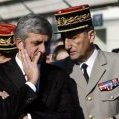This doctrine actually marks the end of the Russian Western dream. Today, it is difficult to figure out the naiveté with which Russia had opened its arms to the Western world at the beginning of the 90s. It was the case in the economic, cultural, military fields, and even in espionage. Yevgeny Primakov told in his Memories* how in order to show good will, the new head of Russian secret services had given the positions of the spy microphones in the American Embassy in Moscow. As for the United States, they had offered some guarantees regarding the non-extension of NATO and their peaceful intentions. The sequel is well known. The twenty following years see NATO reaching Russia’s borders, its Serbian allied bombed, and the Serbian people of Krajina undergoing an unprecedented ethnic cleansing since WW II. The Russian minorities are persecuted in the Baltic States, while in the cradle of the first Russian state in Kiev, the American State Department install an hostile government. The final break occurs when Russia watch with bemusement western democraties remaining indifferent to the artillery bombings of the Ossetian capital, and, notably, the complete destruction of the Jewish neighborhood. For the Russian administration, it is now clear that the moral position of the West is a hypocrisy and a lie.
The warning from President Poutine in Munich, on 11th October 2006, sums up the new military doctrine. It is the result of a double observation, leading to an unprecedented geopolitical turn.
- International law no longer exists. The repeated bombings of NATO and the United States on Serbia or Irak, without declaration of war, or UN mandate, deliberately targeting civilian targets, normally protected by international conventions, have convinced Russia of the obsolescence of international rules. The unilateral recognition of Kosovo, against the UN 1244 resolution, shows that force counts only. It is now the Russian army which guarrantee this independence – who would dare to confront it in the Caucasus ?
- The most immediate threat for Russia is that formed by the United States, who despite their promise, have brought NATO at the doors of Russia. The anti-missile trick only aims at militarizing the countries of Eastern Europe. The so-called anti-missiles will be unable to stop an Iranian vector, for that matter. Whereas they seal in an aggressive manner the former USSR satellites into the Atlantic alliance.
The turning point is not the use of the nuclear weapon. Sanctuarizing the Russian national soil accounts for a very classic doctrine. The real news is that no threat is defined to the East of Russia. It seems that the turn towards Asia, operated by Russia in its economic orientations, has its military equivalent. Facing NATO, seen as an aggressive, obsolete and unfit alliance, Russia and China are now opposing the Shanghai Cooperation Organisation. This forming structure, both political and military, will be an inevitable lever in international relations, while the Asiatic continent is replacing little by little the West in the world leadership.
Russia is the natural penetration of Europe towards Asia. It is also the Anglo-Saxon geopolitical nightmare, because it is the junction between these two continents. By allowing the United States to build a new iron curtail on the European continent, and accepting to diluate their power within the European Union, France and Germany deprive themselves of an opening towards the future. The positive reaction of German Foreign Affairs Minister Guido Westerwelle about the Russian project of Collective Security, as well as the purchase of a French frigate by Russia, points, however, to the possibility of a politico-strategical turn around.
Xavier Moreau
Source : realpolitik.tv
Traduction Geopolintel
The text of the new doctrine : http://www.scrf.gov.ru/documents/99.html
















